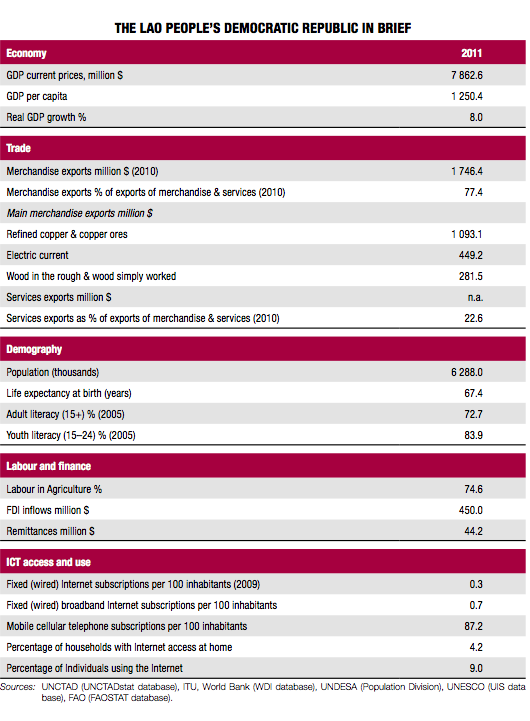Review of e-commerce legislation harmonization in the Association of Southeast Asian Nations (ASEAN) [UNCTAD/DTL/STICT/2013/1]
THE LAO PEOPLE’S DEMOCRATIC REPUBLIC
- In Brief
- Summary
- Electronic transactions law
- Consumer protection
- Privacy and data protection
- Online content regulation
- Cybercrime and cybersecurity
- Online dispute resolution and domain-name regulation
![[ Galexia Dots ]](/images/hr.gif)
In Brief

Summary
The Government of the Lao People’s Democratic Republic has developed an E-Policy and an E-Government Roadmap and is keen to encourage both e-commerce and e-government applications. Meanwhile, significant work remains in the Lao People’s Democratic Republic in order to develop an appropriate legal infrastructure, although the recent passage of the Law on Electronic Transactions in 2012 is encouraging. There are also proposals to develop consumer protection and data protection laws.
While mobile penetration has risen significantly to reach 87 subscriptions per 100 inhabitants in 2011, low levels of Internet, especially at broadband speed, remains a significant barrier to e-commerce developments in the Lao People’s Democratic Republic.
Electronic transactions law
The Lao People’s Democratic Republic received assistance from UNESCAP, UNCTAD and USAID to develop its e-commerce legislation. The law was passed by the National Assembly in December 2012.
The legislation is generally consistent with international models including the UNCITRAL Model Law on Electronic Commerce (1996). It contains provisions that create greater legal certainty when contracting electronically, including provision on functional equivalence and on the formation of electronic contracts.
The new law comprises 9 parts and 55 articles. A full English language translation is not yet available, but the basic content includes:
- Part 1: Objectives and definitions;
- Part 2: Electronic documents and contracts;
- Part 3: Electronic licences;
- Part 4: Electronic transactions within government;
- Part 5: Mediation;
- Part 6: Offences and prohibited acts;
- Part 7: Dispute resolution;
- Part 8: Management and inspection;
- Part 9: Sanctions.
This new development is designed to help the Lao People’s Democratic Republic capture the benefits of e-commerce and e-government. It should also assist the Lao People’s Democratic Republic with the proposed membership of the WTO and integration into the AEC.
Consumer protection
There is no general consumer protection law in the Lao People’s Democratic Republic. However, the new Law on Electronic Transactions may contain some limited online consumer protection requirements.
Privacy and data protection
There is no relevant privacy law in the Lao People’s Democratic Republic.
Online content regulation
The Lao Government controls all domestic Internet servers and retains the ability to block access to Internet sites deemed pornographic or critical of government institutions and policies. The Lao National Internet Committee under the Prime Minister’s Office administers this system, based on a series of regulations.
The primary regulation is the Ministry of Information and Culture, Special Provisions (416/IC) for Control of the Content and the Information and Data Obtained via the Internet System. This states that permissible content of material on the Internet is “beneficial to society...with no impact upon political issues, is not in conflict with the laws and regulations of the Lao People’s Democratic Republic and is not contrary to the fine Lao national culture, customs and traditions”. The regulations include procedures for requesting approval for the content of information and data available on the Internet and for punishment of violations. However, in practice the Government does not appear to block local or foreign sites, and registration of content is not required.
The new Law on Electronic Transactions may also include some provisions relating to online content.
Cybercrime and cybersecurity
The new Law on Electronic Transactions may include some provisions relating to cybercrime.
Online dispute resolution and domain-name regulation
The Telecommunication Law 02/NA of 2001 provides some basic rules for registration and ownership of domain names in the Lao People’s Democratic Republic.
The new Law on Electronic Transactions may include some further provisions on dispute resolution.

![[Privacy Impact Assessment (PIA) for Cooperative Intelligent Transport System (C-ITS) data messages]](/public/ssi/pubs/pub_3.png)
 print this page
print this page sitemap
sitemap rss news feed
rss news feed manage email subscriptions
manage email subscriptions